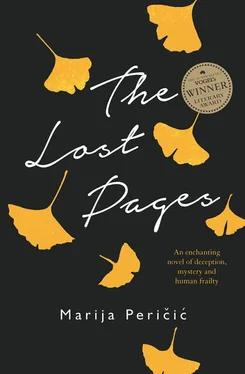‘I often feel I should leave the room when first-time authors see their work in print. I feel like I’m intruding on a lovers’ tryst,’ he had said. His polished face, egg-like, had shone with good humour.
There seemed to be no sign of Franz, or Theodor either, for that matter. I would have been quite happy not to have to see Theodor at all: he would certainly be keen to remind me of my approaching deadline. Lately, the process of writing had become mysterious to me, and at times it felt fraudulent to call myself a writer at all. Most of the time I could not quite believe that I had produced the book that had brought me such success, and I could not understand how I had done it. Looking at the book now was like looking at some complicated mechanical object and being told that I had built it, when I understood not the first thing about its inner workings or how it was put together.
I stood there and scanned the room. Suddenly the crowd shifted and I could make out a plump figure on the far side of the room. It was Uta. She was struggling along, her elbows protruding at awkward angles to shelter the two glasses of schnapps that she was ferrying towards me. The sight of her immediately caused a small knot of muscles in my neck and shoulders to contract in an unpleasant spasm, and I had the impulse to duck behind someone or run from the room. I turned my back to her, hoping, uselessly, to make myself invisible. My body tensed in anticipation of her approach.
Once, at some long-ago point in my life, I might have found Uta attractive, in desperate circumstances with limited light. She was blonde and round with sticky, pinkish skin and a penetrating voice of calculated vivaciousness. I had first come across her at one of the earlier public readings I had given from my novel. At that stage, I was still overwhelmed by the amount of attention I was receiving, particularly female attention, and had, I now saw, responded to her far too warmly. She began to shadow me and attend every reading I gave, besieging me with questions and coy turns of her head. Soon she was appearing regularly on my street at just the moment I was leaving the house to go to work. I would see her everywhere: on the tram, walking on the Laurenziberg, in cafés I frequented. When these tactics of hers brought no return of her affection she managed to befriend my sister Sophie, using her to gain access to my home. Sophie is a girl of infinite kindness and, through her, Uta rapidly won the acceptance of the rest of my family, who were soon loudly proclaiming her charms. To me she seemed like a pestilent cloud that blew through the city, to be avoided at all costs.
I sensed a commotion in the crowd behind me and braced myself for the inevitable tap, which soon came. I made an effort to affix an expression of friendly politeness to my face and turned, groaning inwardly and already planning my escape, but my eyes fell not upon Uta’s frizzed blonde hair and pouting lips but on another face altogether. It was shaped like a heart, with wide cheeks slanting to a little pointed chin, and eyes that were dark and warm: black, with flecks of gold. The eyebrows flew out over them in two straight wings, grave and intense, but the pink lips twitched up at the corners, parted, with two white tooth tips visible within.
‘Excuse me,’ the woman said to me, ‘but are you Herr Kafka?’
I was stunned, able only to look at her. [2] This sentence is crossed out in the manuscript.
The beauty of her face burned into me like a flame, and I wondered that people did not collapse in the street at the sight of it. She was like a woman in a Philipp Veit painting: gentle, and with an air of such sweet melancholy that I wanted to reach out and touch her.
She spoke to me, and for a moment I simply stood and listened to the sound of her voice as though it were music, without understanding the words she uttered. The timbre of her voice was unusually low, with a pleasant burring undertone. If it were the voice of an instrument, it would be a cello, slow and quiet. When the meaning of her words reached me, I realised she was praising Franz’s story.
‘I’m sorry,’ I said, interrupting her. ‘I am Brod. Max Brod. But Kafka is a very good friend of mine.’ I extended my hand, which until then had hung paralysed by my side. She shook it, and introduced herself as Fräulein Anja Železný, but I thought I caught a flash of disappointment in her eyes.
While I still held her hand clasped in mine, I felt another tap on my shoulder, and this time when I turned I was greeted with the face that I had been expecting earlier. The closeness of the room had deposited a shining film over Uta’s pink complexion and small beads of perspiration studded the down that grew on the upper corners of her mouth. She stood very close to me and handed me one of the glasses of schnapps, inserting her body at an angle that blocked me from Fräulein Železný.
She gave a pouting smile that left her eyes unmoved and began in a loud voice to talk some familiar nonsense of my family, seeking to display a closeness between us that was pure fiction. Uta’s voice droned on and on, with the high-pitched cadences of an unpleasant insect trapped in a summer room, beating its head against the hot glass of the windows. After a while I gave up trying to interject and fell silent, hoping for rescue.
With relief, I spotted Theodor fighting his way through the crowd towards me. Though I was keen to avoid Theodor’s questions about my work in progress, this feeling was now outweighed by my desperation to get away from Uta. I was also quite anxious to learn if he had met Franz yet. There still seemed to be no sign of Franz at the party, but the room was far too packed for me to be certain. Of course, by this stage it was inevitable that Theodor had read Franz’s work. I could even see a rolled copy of Hyperion in his hand. I greeted him with excessive warmth, grasping his hand with both of mine, and soon Uta drifted off sulkily. As I had expected, Theodor’s main objective was to reprimand me for my failure to produce a finished manuscript, but I smoothed over my difficulties with a slick of lies. I waved my hands about and made much of how well it was proceeding, and, surprising myself, was even able to improvise some ideas that sounded moderately plausible.
When it seemed that I had satisfied him, I asked, ‘So, have you had the fortune to meet with the great prodigy? Kafka, I mean.’
‘Ha! The great prodigy is a hard man to pin down, it happens. I have not yet had the pleasure. I try and try, but he strings me along like a heartbreaker.’ He shook his head in a sorrow that was not entirely false. Franz’s evasiveness clearly bewildered Theodor, who was used to being courted by would-be writers to the point of harassment. From time to time I noticed his eyes darting through the crowd behind me in a vain search, his eyebrows tensed and lips pursed.
‘I’ve been trying to get hold of the fellow for weeks,’ he went on. ‘I write letters and invite him for lunch, I go to every party, but nothing. The man’s like a ghost.’
‘Perhaps someone else has got to him first,’ I said, voicing my own fears.
Theodor shook his head. ‘Impossible. I’m keeping a close eye on this one. I hope that he’s so hard to catch because he’s locked in a room somewhere, pumping out some more of these.’ He waved his copy of Hyperion . ‘Anyway,’ he continued, ‘you should be happy that he’s not here: less competition.’ He looked at his watch. ‘But I must go. Will you tell him, if you see him, that I would very much like to meet him?’
He laughed when he saw my expression. ‘Don’t worry, my friend,’ he said. ‘I still love your work the most.’
My face darkened with shame.
Theodor began to make for the door, but he was too slow, and soon he was corralled against the window by a little half-moon of hopeful writers, vying with each other for his attention, while he struggled to get away.
Читать дальше












